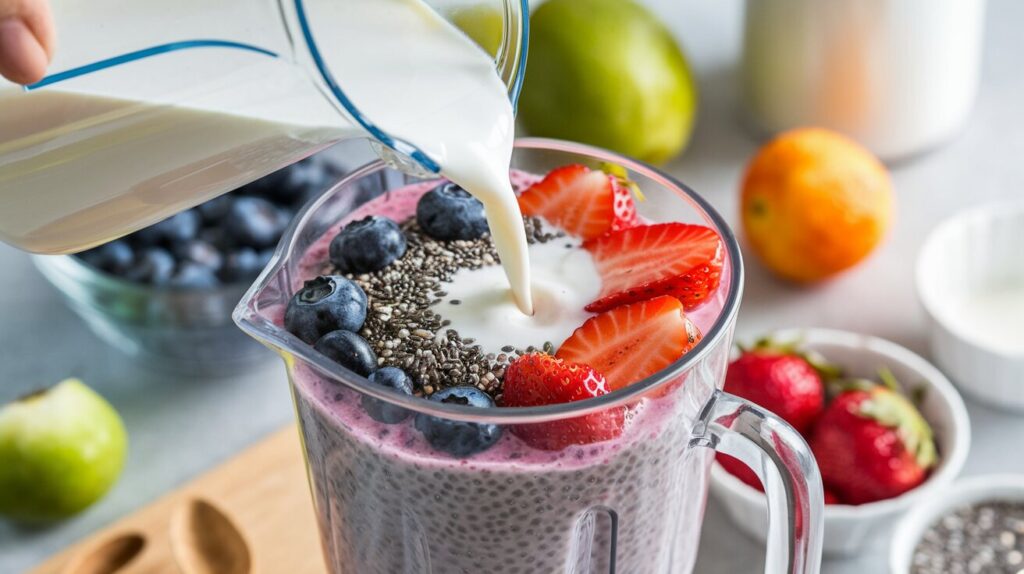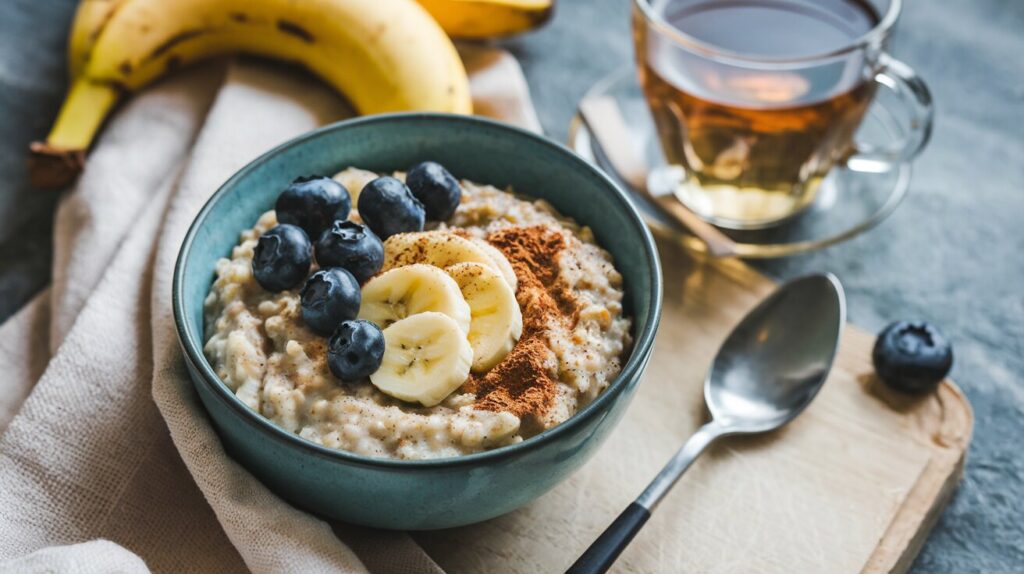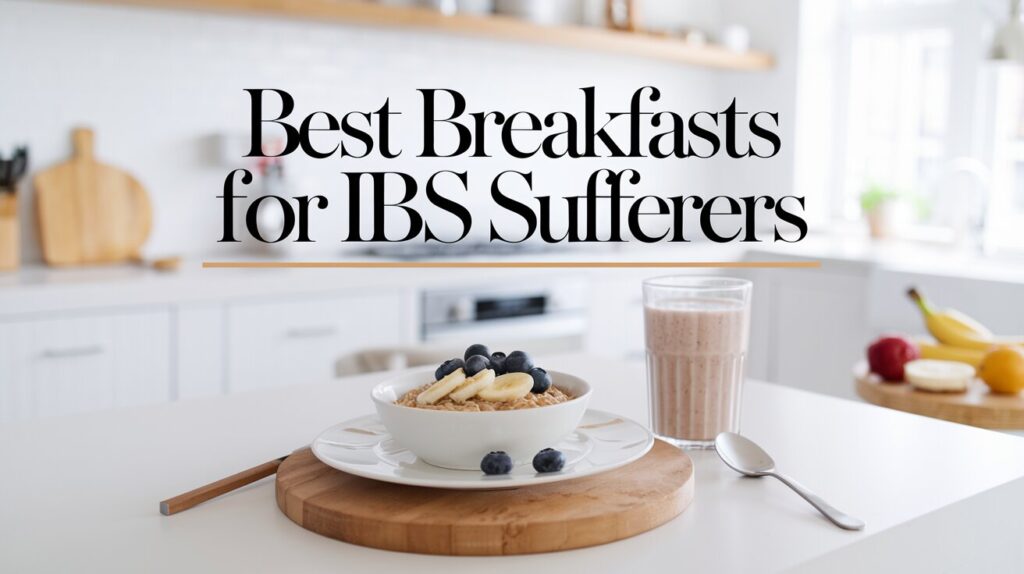Breakfast is often called the most important meal of the day, but for people with Irritable Bowel Syndrome (IBS), finding the best breakfast for IBS sufferers can be a real challenge. The wrong choice can trigger uncomfortable symptoms like bloating or cramps, while the right one can set you up for a calm, productive day. In this guide, we’ll explore IBS-friendly breakfast ideas, tips, and recipes to help you enjoy mornings without worry.
Table of Contents
Understanding IBS and Its Dietary Challenges
What is IBS (Irritable Bowel Syndrome)?
Before we talk food, let’s tackle the elephant in the room: what exactly is IBS? IBS is a chronic gastrointestinal disorder that affects how your intestines work. It’s not life-threatening, but boy, can it be life-interrupting! Common symptoms include bloating, stomach cramps, diarrhea, constipation, or a mix of both. Basically, your gut throws a tantrum when it doesn’t like what you eat.
One thing you’ll quickly learn is that IBS is highly personal. What triggers someone else’s symptoms may not bother you at all. But for many, breakfast is a notorious troublemaker. Why? Because it’s often when our digestive system first kicks into gear after a long rest.
How Diet Impacts IBS Symptoms
Imagine your gut is like a moody roommate. If you give it the wrong breakfast, it’s going to let you know—loudly. The food you eat can either calm your gut or cause it to spiral into chaos. Things like high-FODMAP foods (we’ll get to that in a bit), fatty meals, or even stress while eating can all play a role.
Good news? With the right choices, you can actually reduce flare-ups. Think of your diet as a toolbox—you just need the right tools to keep your gut happy.
Common Dietary Triggers for IBS
Let’s get specific. Here’s a rundown of the biggest breakfast no-nos for most IBS sufferers:
- High-FODMAP Foods: These are short-chain carbs and sugars that ferment in your gut, causing gas and bloating. Think onions, garlic, wheat, and some fruits like apples and mangoes.
- Dairy: Lactose is a common IBS trigger, so milk, yogurt, and cheese might not sit well.
- Caffeine: Coffee lovers, I feel your pain. While caffeine gets us going, it can also get our gut moving too much.
- High-Fat Foods: Greasy breakfasts like bacon, sausage, and buttery toast can send your stomach into overdrive.
Why Breakfast is Crucial for IBS Sufferers
Starting the Day Right: The Importance of Breakfast
Think of breakfast as the foundation of your day. For IBS sufferers, it’s like warming up your car engine on a cold day. A balanced, gut-friendly breakfast can set the tone for smooth digestion throughout the day. Skip it, and you might find yourself dealing with hangry, grumpy gut issues.
But here’s the catch: not all breakfasts are created equal. While a big, greasy fry-up might sound tempting, it’s probably not going to do you any favors if you have IBS. Instead, aim for something that’s easy on your stomach but still keeps you full and energized.
How Breakfast Can Worsen or Improve IBS Symptoms
Ever had a breakfast that made you feel like you swallowed a balloon? That’s because the wrong foods can trigger gas, bloating, or worse. The key is balance: low-FODMAP ingredients, moderate portions, and easy-to-digest options.
For example:
- A smoothie made with almond milk and low-FODMAP fruits can be a gentle start.
- On the other hand, a double latte with a cream cheese bagel? Probably a one-way ticket to stomach cramps.
“Your breakfast isn’t just about fueling your body—it’s about keeping the peace with your gut.”
Key Factors to Consider When Choosing IBS-Friendly Breakfasts
Low FODMAP Foods: A Lifesaver for IBS Sufferers
Here’s where things get scientific. The Low-FODMAP diet is like a cheat code for IBS sufferers. FODMAP stands for fermentable oligosaccharides, disaccharides, monosaccharides, and polyols. (Say that five times fast!) These are carbs that are poorly absorbed in the gut and lead to—you guessed it—symptoms.
Low-FODMAP options to include in your breakfast:
- Gluten-free bread or oats
- Bananas, blueberries, and strawberries
- Almond or coconut milk
- Eggs (a fantastic protein choice)
Avoid high-FODMAP culprits like apples, pears, and wheat-based products.
Avoiding Gas-Producing Ingredients in Breakfast
If you’ve ever had to unbutton your jeans after breakfast, you know what I mean. Gassy ingredients can wreak havoc. Beans, broccoli, onions, and even sugar-free sweeteners (like sorbitol) are common offenders. Stick to simple, whole ingredients to keep your gut calm.
Pro Tip: “If it makes you burp or fart more than usual, it’s probably not your IBS-friendly breakfast buddy.”
Balancing Fiber: Soluble vs Insoluble Fiber for IBS
Fiber can be a double-edged sword for IBS sufferers. You need it for healthy digestion, but too much—or the wrong type—can backfire.
- Soluble Fiber: Found in oats, bananas, and carrots, this type dissolves in water and can soothe your gut.
- Insoluble Fiber: Found in whole grains and raw veggies, this type can be rough on a sensitive stomach.
Think of it like choosing a gentle hug (soluble fiber) over a bear hug (insoluble fiber). Both are good, but timing matters.
So, what have we learned so far? IBS is like a moody artist—it demands a lot of attention, especially in the morning. But with the right breakfast choices, you can tame your symptoms and start your day on the right note.
Top Breakfast Ideas for IBS Sufferers
Now that we’ve covered the basics of IBS and how it relates to breakfast, let’s get to the fun part: what can you actually eat? Finding the perfect breakfast for IBS sufferers doesn’t have to feel like solving a Rubik’s cube. With the right ingredients and some creativity, you can whip up breakfasts that are tasty, filling, and gut-friendly.
Smoothies and Shakes: IBS-Friendly Recipes
Let’s start with smoothies—because, let’s be real, who doesn’t love a good smoothie? Smoothies are a fantastic IBS breakfast option because they’re easy to digest, packed with nutrients, and totally customizable. The trick? Use low-FODMAP ingredients.

Here’s an IBS-approved smoothie recipe:
Low-FODMAP Berry Smoothie Recipe
- 1 cup almond milk (unsweetened)
- 1/2 cup frozen blueberries
- 1/2 cup frozen strawberries
- 1 tablespoon chia seeds (soaked in water for 10 minutes)
- 1 scoop of low-FODMAP protein powder
Blend it all together and enjoy!
You can also try:
- Banana-Peanut Butter Smoothie: Use a firm (unripe) banana, which is low in FODMAPs. Add 1 tablespoon of natural peanut butter and almond milk.
- Tropical Green Smoothie: Combine spinach, pineapple, and coconut milk for a refreshing morning boost.
Why it works: Smoothies are gentle on the stomach since the ingredients are already broken down, making digestion easier.
Low-FODMAP Oatmeal Recipes and Variations
Oatmeal is like the comfort blanket of breakfasts. But for IBS sufferers, regular oatmeal toppings can be a minefield. No worries—I’ve got you covered.
Basic IBS-Friendly Oatmeal Recipe

- 1/2 cup gluten-free oats
- 1 cup almond or coconut milk
- 1/2 teaspoon cinnamon
- 1 tablespoon maple syrup (optional for sweetness)
- Top with blueberries and a few slices of banana
Cook it on the stovetop or microwave, and you’ve got yourself a warm, satisfying bowl of goodness.
Discover more IBS-friendly breakfast options in this guide on Low-FODMAP breakfast favorites.
Fun Add-Ons:
- Chia Seeds: Add fiber without the bulk.
- Pumpkin Puree: A unique, IBS-friendly option for fall vibes.
- Low-FODMAP Nuts: Sprinkle on some walnuts or pecans for crunch.
Pro Tip: Avoid high-FODMAP fruits like apples or pears as toppings. Stick to IBS-friendly fruits like strawberries, kiwis, or firm bananas.
Egg-Based Breakfast Options
Eggs are a powerhouse of protein and an absolute gem for IBS sufferers. They’re versatile, quick to prepare, and easy on the stomach.
IBS-Friendly Egg Dishes
- Scrambled Eggs with Spinach:
- Whisk two eggs with a splash of almond milk.
- Sauté a handful of spinach in olive oil and fold it into your scrambled eggs.
- Poached Eggs on Gluten-Free Toast:

- Poach one or two eggs and serve them on a slice of low-FODMAP gluten-free bread.
- Add a sprinkle of salt and a dash of olive oil.
- Vegetable Omelet:
- Use IBS-friendly veggies like spinach, zucchini, or bell peppers. Avoid onions or garlic, as they’re high-FODMAP troublemakers.
“Eggs are the Swiss Army knife of IBS breakfasts—so simple, yet so satisfying.”
Gluten-Free and Dairy-Free Alternatives
One of the biggest challenges for IBS sufferers is avoiding gluten and dairy, which are common triggers. Luckily, there are tons of tasty alternatives out there.
Ideas for Gluten-Free Breakfasts
- Toast with Low-FODMAP Toppings: Use gluten-free bread and top with:
- Peanut butter and firm banana slices
- A drizzle of olive oil with a pinch of salt
- Pancakes: Use a gluten-free pancake mix and almond milk. Add blueberries for sweetness.
Ideas for Dairy-Free Breakfasts
- Coconut Yogurt Bowls:
- Use unsweetened coconut yogurt as your base.
- Top with granola made from low-FODMAP ingredients like oats and seeds.
- Dairy-Free Smoothie Bowls: Blend almond milk, firm bananas, and strawberries, then top with chia seeds and crushed walnuts.
Why it works: These options avoid lactose and gluten, two major IBS triggers, while still being filling and flavorful.
Quick Grab-and-Go Breakfasts for IBS Sufferers
Busy mornings? I’ve got you. Here are some IBS-friendly options that you can prep in advance or grab on your way out the door:
- Overnight Oats:
- Prepare a jar of oats the night before using almond milk and low-FODMAP fruits.
- Add chia seeds for extra fiber.
- Rice Cakes with Peanut Butter:
- Rice cakes are naturally gluten-free. Spread a thin layer of natural peanut butter on top and go!
- Low-FODMAP Granola Bars:
- Look for store-bought options labeled as low-FODMAP, or make your own with oats, maple syrup, and safe nuts like pecans.
- Boiled Eggs:
- Make a batch of boiled eggs at the start of the week for a protein-packed, portable snack.
Pro Tip: Keep IBS-friendly snacks like bananas or gluten-free granola bars handy for mornings when life gets hectic.
Foods to Avoid During Breakfast with IBS
Before we wrap up this section, let’s recap some breakfast foods you should steer clear of:
- High-FODMAP Fruits: Apples, mangoes, and cherries might seem healthy, but they can wreak havoc on your gut.
- Dairy Products: Milk, cream, and yogurt are off the table unless they’re lactose-free.
- Wheat-Based Products: Bagels, regular bread, and pastries can trigger symptoms for many IBS sufferers.
- Caffeinated Beverages: Coffee and energy drinks can be overly stimulating to the digestive system.
“Think of your gut like a VIP—it deserves special treatment.”
Breakfast doesn’t have to be a minefield if you have IBS. With a little planning and the right ingredients, you can create meals that are not only safe but delicious and satisfying.
Common Problems and Solutions Related to IBS-Friendly Breakfasts
Eating breakfast as someone with IBS can feel like walking a tightrope. One wrong step (or ingredient), and you’re dealing with symptoms that can ruin your whole day. Let’s dive into the most common challenges IBS sufferers face with breakfast and, more importantly, how to solve them. Ready? Let’s tackle this head-on!
Difficulty Identifying Trigger Foods
Ever felt like your gut has a mind of its own? One of the hardest parts of managing IBS is figuring out which foods are your enemies. Something as simple as a slice of toast could be fine one day and cause chaos the next. Why does this happen? Because IBS triggers can vary depending on stress, sleep, and even hormones.
The result? Many IBS sufferers feel stuck in a cycle of trial and error, not knowing what’s safe to eat.
Lack of Time for Healthy Meal Preparation
Let’s be real—most of us aren’t waking up an hour early to whip up a gourmet breakfast. If you’re rushing out the door in the morning, finding time to prepare an IBS-friendly meal can feel impossible. And when you’re short on time, it’s tempting to grab something quick like a pastry or a bagel, which often worsens symptoms.
“Does it feel like IBS and busy mornings don’t mix? You’re not alone!”
Eating Out: Breakfast Choices When Dining Away
Eating breakfast at a restaurant or café can feel like navigating a minefield. Menus aren’t exactly designed with IBS in mind. The eggs might be cooked in butter, the toast might be wheat-based, and who knows what’s lurking in that smoothie bowl? Dining out can be a gamble that leaves you wondering, “Will this ruin my day?”
Finding Variety in IBS-Friendly Breakfasts
Let’s face it—IBS-safe breakfasts can get boring. Oatmeal, eggs, and gluten-free toast are great, but eating the same thing every day can get old fast. Many people with IBS worry that they’ll have to sacrifice variety for safety, which can make sticking to a diet feel like a chore.
Solutions to Breakfast-Related IBS Problems
Keeping a Food Diary to Track Symptoms
If you don’t already have a food diary, now’s the time to start one. Keeping track of what you eat and how it makes you feel can be a game-changer. It’s like being a detective for your own gut!
Here’s how to do it:
- Log your meals: Write down what you ate, the portion size, and the time.
- Note your symptoms: Record any bloating, cramps, or other discomfort you experience.
- Look for patterns: Over time, you’ll start to see which foods are your friends and which ones are your foes.
“A food diary is your IBS GPS—it helps you navigate meals with confidence.”
Working with a Dietitian for IBS Management
Feeling overwhelmed? You don’t have to do this alone. A dietitian who specializes in IBS can help you create a personalized plan. They can guide you through the Low-FODMAP diet, suggest alternatives to your favorite foods, and even help with recipes.
Why it works: A dietitian brings expertise and takes the guesswork out of managing IBS. Think of them as your gut’s personal trainer.
Adjusting Breakfast Choices Based on IBS Subtypes
Did you know there are different types of IBS? Your symptoms might lean more toward constipation, diarrhea, or a mix of both. Understanding your IBS subtype can help you fine-tune your breakfast choices.
Constipation-Dominant IBS (IBS-C):
- Focus on soluble fiber: Foods like oats, chia seeds, and bananas can help get things moving.
- Stay hydrated: Drink a glass of water with your breakfast to support digestion.
- Avoid too much fat: High-fat foods can slow digestion and worsen constipation.
For Diarrhea-Dominant IBS (IBS-D):
- Stick to low-FODMAP, easy-to-digest foods: Smoothies, scrambled eggs, and rice cakes are great options.
- Skip the caffeine: Coffee can be a major trigger for diarrhea.
- Limit insoluble fiber: Avoid raw veggies and whole-grain cereals in the morning.
For Mixed IBS (IBS-M):
- Keep it balanced: Focus on moderation with fiber and portion sizes.
- Monitor your symptoms: Your triggers may vary, so flexibility is key.
Pro Tip: Tailor your breakfast to your body’s specific needs. What works for one IBS subtype might not work for another.
Meal Prep and Planning for IBS-Friendly Breakfasts
Busy mornings don’t have to mean IBS-triggering breakfasts. Meal prep can save you time and stress while ensuring you always have a safe option on hand.
Here’s how to prep like a pro:
- Batch Cook: Make a big batch of oatmeal or boiled eggs at the start of the week.
- Pre-Portion: Store smoothie ingredients in freezer bags for quick blending.
- Invest in Containers: Mason jars are perfect for overnight oats or yogurt bowls.
FAQs
What should I drink in the morning if I have IBS?
If you have IBS, what you drink in the morning matters just as much as what you eat. Opt for beverages that are gentle on your stomach and avoid triggering symptoms.
Best Drinks for IBS:
- Herbal Teas: Chamomile, peppermint, or ginger tea can soothe your digestive system and reduce bloating.
- Water: Start your day with a glass of lukewarm water to gently wake up your digestive system.
- Smoothies: Low-FODMAP smoothies made with almond milk, spinach, and IBS-friendly fruits like blueberries or firm bananas are a great choice.
- Lactose-Free Milk Alternatives: Unsweetened almond milk, coconut milk, or oat milk are gut-friendly and safe options.
Avoid: Coffee, regular milk, sugary juices, or carbonated beverages, as they can irritate your gut.
Is scrambled egg good for IBS?
Yes, scrambled eggs are a great breakfast option for IBS sufferers! Eggs are high in protein, easy to digest, and versatile, making them a fantastic choice for sensitive stomachs.
Why Scrambled Eggs Work for IBS:
- Low in FODMAPs: Eggs contain no fermentable carbohydrates, so they are unlikely to trigger IBS symptoms.
- Gentle on the Stomach: Their soft texture is easy to digest.
- Customizable: You can add IBS-friendly toppings like spinach or zucchini to make them more nutritious.
Pro Tip: Cook them with olive oil or lactose-free butter instead of regular butter to keep them IBS-friendly.
What’s best to eat when IBS flares up?
During an IBS flare-up, your gut is more sensitive than usual, so eating simple, easily digestible foods is crucial.
Best Foods for IBS Flares:
- Plain Rice or Rice-Based Meals: Gentle on the stomach and easy to digest.
- Cooked Vegetables: Steamed carrots, zucchini, or spinach are great low-FODMAP choices.
- Oatmeal: Made with almond milk and a dash of cinnamon, oatmeal is comforting and non-irritating.
- Bananas: A firm banana is low in FODMAPs and provides quick energy.
- Soup or Broth: Clear, low-fat soups with soft vegetables or proteins like chicken are soothing.
Avoid: Spicy, fatty, or high-FODMAP foods like garlic, onions, and beans during flare-ups.
Conclusion: Taking Control of Your Breakfast Routine
Breakfast doesn’t have to be a battle when you have IBS. With a little planning, creativity, and knowledge of your triggers, you can enjoy morning meals that fuel your body without upsetting your gut.
From smoothies and oatmeal to eggs and toast, the options are endless once you know what works for you. So go ahead, experiment with recipes, keep track of your triggers, and most importantly, enjoy your breakfast.
Learn more about the FODMAP diet and explore gut-friendly recipes to support happy digestion.

